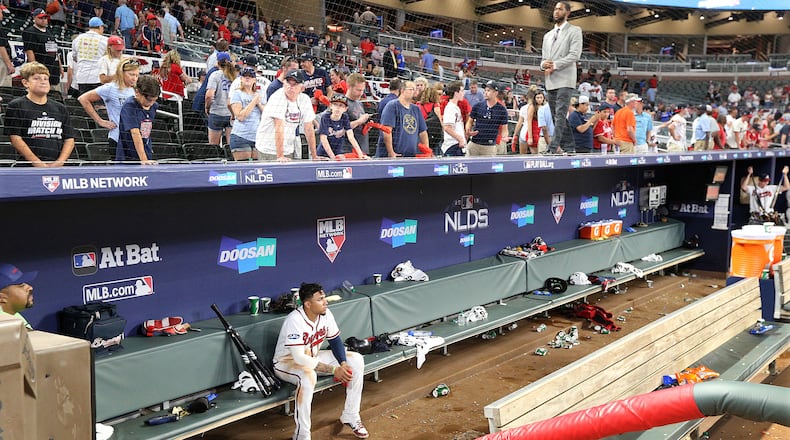For the youngest Braves, Monday night at SunTrust Park was the same painful rite of passage navigated by so many of their forebears.
While it certainly was nothing new for those in the Braves’ home dugout to end a season watching someone else celebrate a postseason series victory, it hadn’t happened before in this particular ballpark. Call it another kind of SunTrust Park christening, the kind no one wants to attend.
And it certainly never had happened to Ozzie Albies.
» Mark Bradley: Braves' future still looks bright
On Monday night, as the Los Angeles Dodgers made merry on the Braves’ home field – in the muted fashion of a team that very much expected to advance – Albies stood quietly off to the side with his even younger buddy Ronald Acuna and watched.
The Dodgers had just hammered out a 6-2 victory, completing their obligation to move on to the National League Championship Series while eliminating the Braves in four games. And another generation of Braves players was filing away the experience.
“It’s not fun to watch that,” said Albies, the Braves’ 21-year-old second baseman. “You want to be the one doing that and let them watch.”
For the eighth time in the 2000s, the Braves lost a playoff series at home, setting off champagne showers in the visitors’ clubhouse. Cardinals had cavorted at Turner Field amid confusion over the infield fly rule. Cubs had celebrated there, with too many of their people in the stands. Giants and Diamondbacks and Astros, too. Oh, my.
The sudden finality of losing in the postseason always is difficult, but it’s particularly wrenching when the end comes inside one’s home park. Even more so when that home still has the new-stadium smell to it, and is unscarred by some of those unpleasant memories of playoffs past.
At least the Braves' young core got this experience out of the way. And its sting was mitigated by the knowledge that just getting here as a division champion was more than any sane mind could have contemplated six months ago. A crowd that applauded them afterward also was a useful balm.
That is what these young, playoff first-timers tried to emphasize.
“I’m proud of the team, proud of the work we put in,” said Acuna, a front-runner for rookie of the year. “Obviously, we didn’t reach our goal of advancing to the next round, but it was a tremendous experience. A good first experience.”
“I’m going to appreciate this season. I want to thank everyone for what they have done to help the team win and get to this time of year,” Albies said.
Impetuous youth was a main theme of the surprising Braves of 2018. And questions about how they would stand up under the unfamiliar pressures of October were loud and frequent entering this series against the highly experienced Dodgers.
Now we know. The young Braves still have much to learn.
For the Braves, this series was a study in the inconsistencies that players of a certain age bring with them to the park.
One day, Acuna was becoming the youngest player in baseball history to hit a postseason grand slam. The next – Monday – he was going a very quiet 0-for-5 at the top of the lineup. That dropped him to a .187 batting average for the four games.
Albies spent much of this season running wild around the bases, his helmet too afraid to take the trip with him. He was a human sugar high. Then came the late-season crash – and he hit but .200 in the Dodgers series.
Third baseman Johan Camargo, 24, had spent this season proving to doubters that he was an everyday player. Then he gets to his first postseason and goes 0-for-15 at the plate.
A 25-year-old pitcher – Chad Sobotka – flashes filthy stuff during the season then gives up a three-run homer to the Dodgers’ Manny Machado in the seventh inning Monday that is the exclamation point to the home-run hitting contest L.A. staged in conjunction with the NLDS this week.
These are the highs and lows you live with, when you live with a young team.
A lone figure in the Braves’ dugout after everyone else had evacuated to the clubhouse, Camargo made for one of the more poignant postgame scenes Monday. He had a lot to ponder.
“For me it was more a feeling of wondering, looking over there and thinking to myself what it would have been like if we were the ones celebrating here on our home field, with our fans,” he said afterward through an interpreter.
“A feeling of sadness. We didn’t meet our goals, to get to the next round, that was the expectation we put on ourselves. That’s baseball, there are highs and lows, good times and bad. That’s a part of it.”
For better and worse, the young Braves grew up a little bit more this series.
This is but the latest generation to find itself spectators to another team’s happiness. We’ll see what this group does with the memory.
“You don’t want to be watching (the other team celebrate) next year,” Albies said. “We want to be letting them watch us.”
About the Author
Keep Reading
The Latest
Featured


